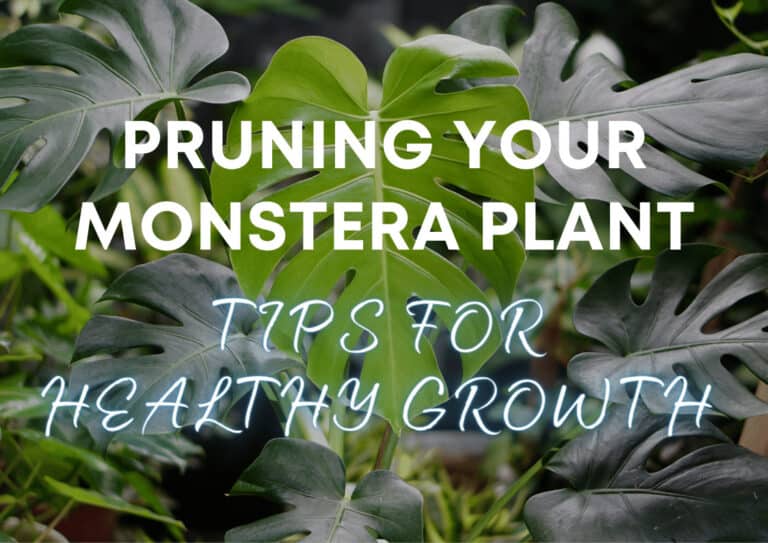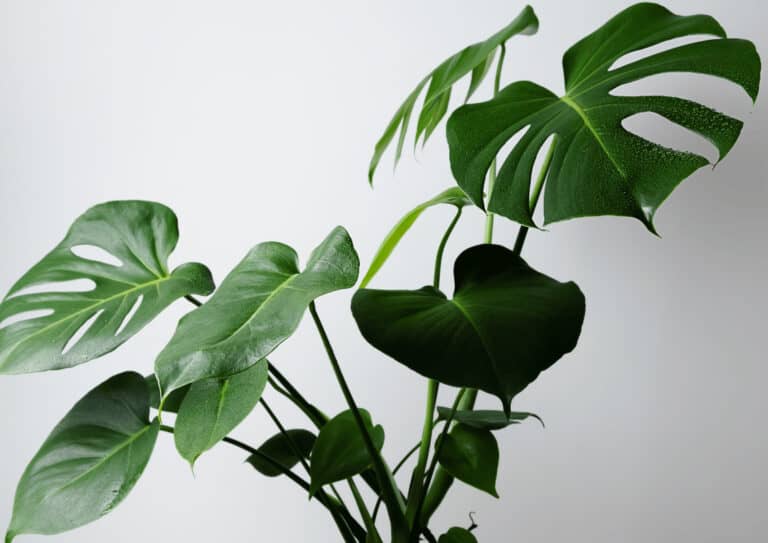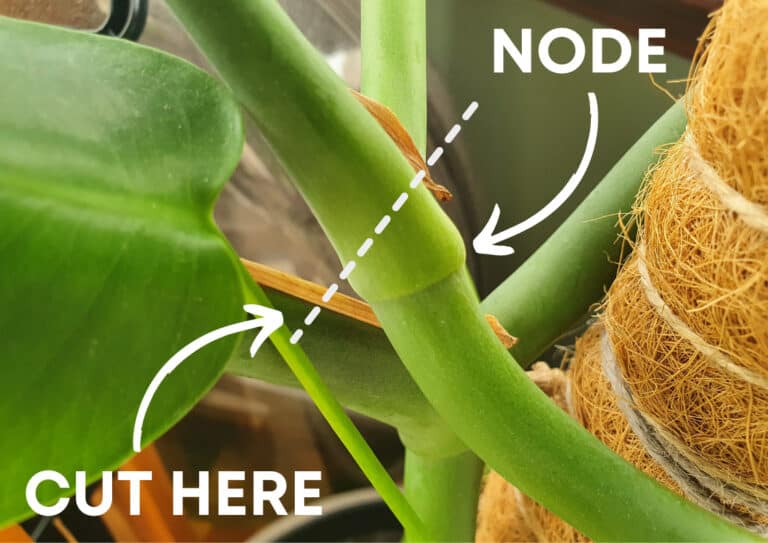Pruning Your Monstera Plant: Tips for Growth and Disease Prevention
-
Chris Dosser
- May 13, 2023
If you buy something using the retail links in our articles, sometimes we earn a small affiliate commission. This does not impact the products we recommend.
Pruning your Monstera plant can seem like a daunting task, but with a little knowledge and practice, it can become an easy and rewarding part of your plant care routine. Proper pruning can not only promote growth and prevent disease, but it can also help your plant maintain a beautiful bushy and full aesthetic.
When it comes to Monstera plants, pruning is especially important as they can grow quite large and unruly if left unattended. By removing dead or damaged leaves, as well as any growth that is out of control, you can help your plant focus its energy on producing healthy new growth.
In this article, I will guide you through the process of properly pruning your Monstera plant, from identifying which leaves to remove, to using the right tools and techniques for the job. With a little practice and patience, you can become a pro at pruning your Monstera plant, and enjoy a healthy and vibrant addition to your home or office.

Why prune your Monstera plant?
As a plant enthusiast, I have learned that pruning my Monstera plants is an essential part of their care routine. Pruning being the process of removing specific parts of a plant to promote growth to improve its appearance, and prevent the spread of disease. Pruning your Monstera plant can help it grow healthier and stronger. Here are a few reasons why you should consider pruning your Monstera plant:
1. Encourages growth
Pruning your Monstera plant can help it grow more vigorously. By removing dead or damaged leaves, you can redirect the plant’s energy to new growth. Pruning also stimulates the plant to produce new shoots, which can lead to a fuller and more lush appearance.
2. Prevents disease
Pruning can help prevent disease in your Monstera plant. By removing diseased or damaged leaves, you can prevent the spread of infection to healthy parts of the plant. Pruning also improves air circulation around the plant, which can reduce the risk of fungal and bacterial diseases.
3. Improves appearance
Pruning your Monstera plant can help improve its appearance. By removing overgrown or leggy branches, you can create a more balanced and aesthetically pleasing shape. Pruning also helps to control the size of the plant, which is especially important if you have limited space.

When to prune your Monstera?
As a plant enthusiast, I always make sure to prune my Monstera plant regularly to promote growth and prevent disease. Pruning is an essential part of Monstera plant care, and it is crucial to know when to prune your plant to ensure its health and beauty.
The best time to prune your Monstera plant is during the growing season, which is typically from spring to early fall. Pruning during this time will allow your plant to recover quickly and grow new leaves. Avoid pruning during the winter months when your plant is dormant, as this can cause stress and damage to the plant.
It is also essential to prune your Monstera plant after it has reached a certain size. When your plant becomes too large, it can be challenging to manage, and it may not receive enough light or nutrients. Pruning your plant will help it maintain a manageable size and encourage healthy growth.
When pruning your Monstera plant, make sure to use clean and sharp pruning shears to avoid damaging the plant. It is also essential to remove any dead or diseased leaves to prevent the spread of disease.
In conclusion, pruning your Monstera plant is an essential part of its care, and knowing when to prune is crucial. Prune your plant during the growing season, after it has reached a certain size, and use clean and sharp pruning shears to avoid damaging the plant.

How to prune your Monstera plant
As a plant enthusiast, I have learned that pruning is an essential part of caring for my Monstera plant. Pruning helps to promote growth and prevent disease. In this section, I will guide you through the process of properly pruning your Monstera plant.
Tools you will need
Before we get started, let’s gather the necessary tools:
- Pruning shears
- Gloves (optional)
Make sure your pruning shears are sharp and clean to avoid damaging the plant while pruning. Gloves are optional, but they can protect your hands from any sharp edges or irritants.
Step-by-step pruning guide
- Identify the stems or leaves that need to be pruned. Look for yellow or brown leaves, stems that are growing in the wrong direction and rubbing up against other parts of the plant, or stems that are too long.
- Use your pruning shears to make a clean cut on the stem or leaf. Cut the stem just above a node, which is the point where leaves attach to the stem. Cutting above a node will encourage new growth.
- If you have a vining Monstera plant, you can trim the stems at any length to control the plant’s size. Cut the stem just above a leaf node, and new growth will emerge from the node.
- If you notice any aerial roots, you can trim them as well. Aerial roots are the roots that grow above the soil line and attach to nearby objects. Trim the aerial roots close to the stem, but be careful not to damage the stem.
- Dispose of any pruned leaves or stems in the trash or compost bin.
That’s it! Pruning your Monstera plant is simple and can be done in just a few minutes. Remember to prune your plant regularly to promote growth and prevent disease.
Our Favorite Monstera Plants And Supplies On Etsy
Tips for promoting growth and preventing disease
As an experienced plant owner, I have learned that proper pruning is crucial to maintaining a healthy and thriving Monstera plant. Here are some tips that I have found to be effective in promoting growth and preventing disease:
Fertilizing your Monstera plant
I recommend fertilizing your Monstera plant every two weeks during the growing season (spring and summer) with a balanced liquid fertilizer. This will provide your plant with the necessary nutrients (N, P, K) to support healthy growth. During the dormant season (fall and winter), reduce fertilization to at most once a month, or halt it altogether.
Watering your Monstera plant
Overwatering can lead to root rot and other diseases, so it’s important to water your Monstera plant properly. I suggest waiting until the top inch of soil is dry before watering. When you do water, make sure to saturate the soil completely. Avoid letting your plant sit in standing water, as this can lead to root rot.
Monitoring for pests and diseases
Regularly inspect your Monstera plant for signs of pests and diseases, such as yellowing leaves, brown spots, or wilting. If you notice any problems, take action immediately to prevent further damage. I recommend using natural pest control methods, such as neem oil or insecticidal soap, to avoid exposing your plant to harmful chemicals.
By following these tips, you can help your Monstera plant thrive and prevent common diseases. Remember to always monitor your plant and adjust your care routine as necessary.
Take home message
Regular pruning will encourage your Monstera plant to grow fuller and healthier. It will also prevent the plant from becoming too large and overwhelming your space. By taking the time to prune your Monstera, you will be rewarded with a beautiful and thriving plant.
If you have any questions or concerns about pruning your Monstera, don’t hesitate to reach out. Happy pruning!

Chris Dosser
Co-Founder of Eden Indoors
Chris is a self-taught horticulturist with over a decade of experience caring for houseplants and creating lush, thriving indoor oases. He specializes in Monstera, and by self admission has a serious problem with buying and propagating rare indoor plants!
Similar Posts
Upgrade Your Monstera Game: How to Encourage Leaf Splitting
What are the steps you can take to encourage your Monstera plant to develop larger and more dramatic splits in its leaves?
Why Are The Leaves Falling Off My Monstera Plant? (Incl. Fixes)
Are the leaves on your Monstera plant looking a bit droopy? Chances are it's nothing serious but to get your plant back to full health you need to act now!



